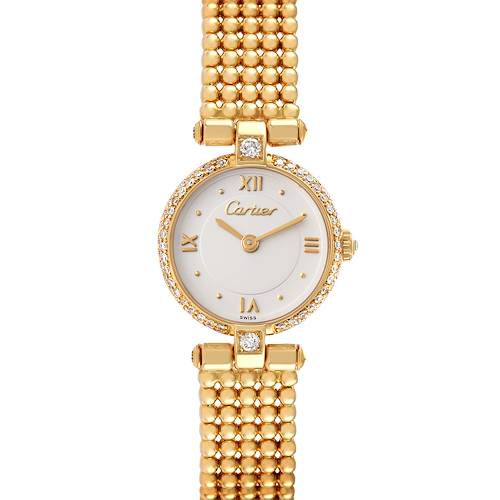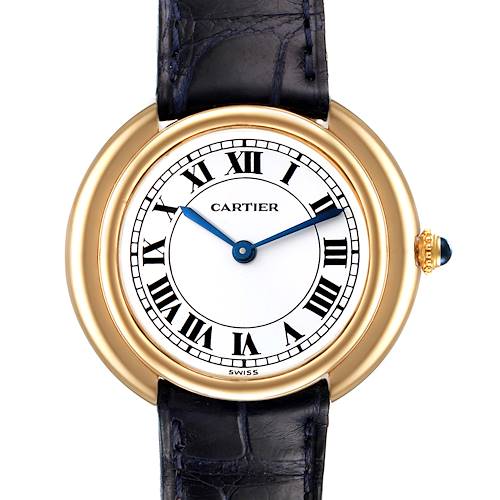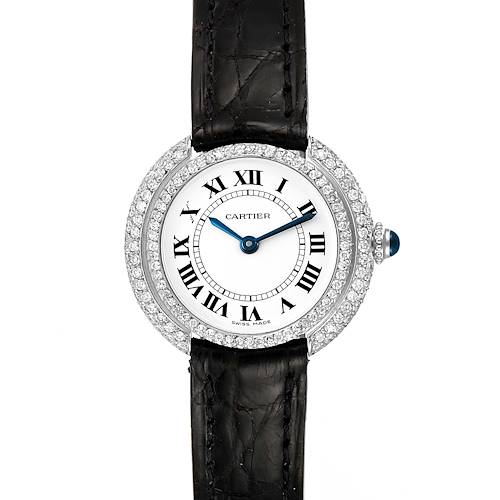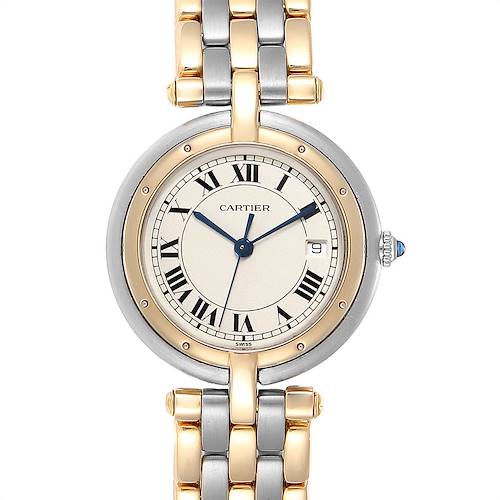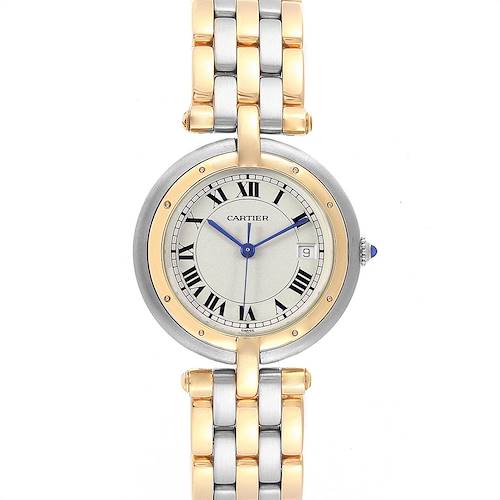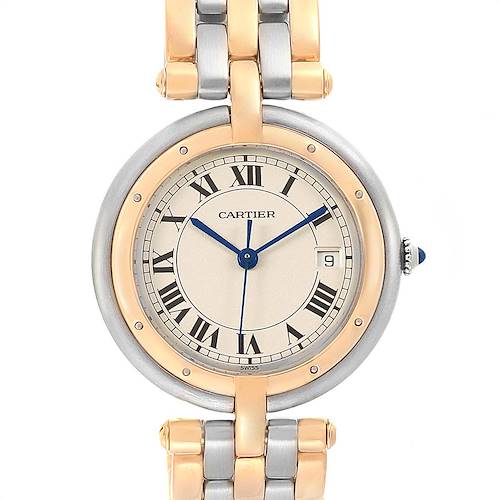- CALL US (404) 814-1814
- LIVE SUPPORT
- EMAIL US
-
WISHLIST (0)
-
CART(0)
Women's Vendome | Cartier Watch Collection
6 MATCHES FOUND
Cartier Vendome Collection

When Cartier was established in 1847 by Louis-Francois Cartier, they were focused on the production of the finest jewelry and objet d’art. It was forty years after that his grandson, Louis Cartier, would design the first wristwatch for men – the Cartier Santos. The Maison would be known worldwide for their neoclassical jewelry and elegantly designed yet functional timepieces.
In 1899, Cartier opened their flagship store at the now famous address of 13 Rue de la Paix, just a few steps away from Place Vendome, one of Paris’ most famous and beautiful neoclassical squares. It is located in the first arrondissement of Paris, and the grandiose setting attracts quite the crowd. The likes of Frederic Chopin and F. Scott Fitzgerald took up residence in the square, and today it is home to the world’s most luxurious brands.
Cartier decided to create a watch in homage to their flagship, as part of the “Louis Cartier” revamped collection of 1973. As a part of this range, the Cartier Vendome channels the Parisian elegance of the famous square.
What was different about the Cartier Vendome watch was the way the case and the strap were attached. Whereas most watches have straps that fit right into the lugs, the Vendome features a T-strap bar across the top and bottom of the watch case, where the strap is inserted. The juxtaposition of angular lines and a perfectly round circle gives it a sleek, sophisticated look and distinctive presence on the wrist. Classic white Cartier dials with painted Roman numerals and blued sword hands adorn the unique construction.
While the original Vendome watch featured a round case, its T-strap lugs were later adapted to Cartier’s iconic watch families, among them the Santos, Panthere, and Ronde. Below are the models released with the Cartier Vendome style lugs:
Cartier Vendome Bi-Plan – an Art Deco style watch with a twist. This features a round case that has T-strap lugs attached to the bracelet, in place of the more traditional vertical lugs. It gets its name from the bi-planes of the 1900s, whose two sets of wings are parallel to one another. The horizontal bars that flank the round case give this timepiece an Art Deco quality, and an unobstructed view of the luxurious leather strap.
Cartier Vendome Ronde – while the Vendome is famous for lugs that hardly touch the case, this was one model that did not have the T-bar lugs. Instead, its case its equipped with openings on the side to accommodate the strap. Moreover, this timepiece features a double-stepped, smooth case, whose round shape is further emphasized with the strap closely fitted onto it.
Cartier Panthere Vendome – the Cartier Panthere is famous for its supple five-link bracelet with sinuous hinges, calling to mind the finesse of the feline animal. With the Panthere Vendome, the single bridge lugs connect the famous bracelet to the round case. As this model was introduced in the 1980s, it came in solid gold and two-tone finishes which were so in vogue at the time.
Cartier Santos Ronde Vendome – Aside from its square case, the Cartier Santos is famous for its exposed screws, which lend an industrial look to the timepiece. Meanwhile, the Ronde is characterized by its round case with a flat bezel. The Santos Ronde Vendome is a mashup of all three, marrying the hardy look of the Santos with the classic round case of the Ronde, and the shoulder lugs of the Vendome. In Santos’ style, eight exposed screws are visible on the case bezel, and throughout the edges of each bracelet link. With its solid gold and steel and gold finishing, this medley gives off a chic 1980s aesthetic.
Cartier Must Vendome – In the 1970s, at the tail end of the Quartz Crisis, Cartier introduced the Must de Cartier line. The range sought to introduce Cartier to a wider audience, by creating versions of the brand’s most famous watches in more affordable editions. Must de Cartier, which translates to “Cartier, it’s a Must”, achieved this by crafting their famous designs in vermeil, or silver gilded with gold. Moreover, instead of the in-house movements of Cartier, these watches used either quartz movements or ETA-based movements. Must Vendome watches took after the original Must line, with an assortment of Classic Cartier Roman dials or minimalist block color dials, paired with leather straps.
Unafraid to push boundaries, Cartier has proven itself the master of designing case shapes time and again, with highly imaginative watches like the Cartier Vendome.
COMMON QUESTIONS ABOUT THE CARTIER VENDOME WATCH
The Cartier Vendome channels Parisian elegance with its Art Deco aesthetic and unique lug design. Here are the most frequently asked questions about the Cartier Vendome.
WHAT IS A CARTIER VENDOME WATCH?
The Cartier Vendome watch was introduced in 1973 as part of the revamped Louis Cartier collection from the Maison.
What makes it different are its T-strap shoulder lugs which create a distinct look, as they do not attach the case to the strap the whole way through.
The original Vendome watch has a round case with the said shoulder lugs, but it has also been adapted into the Maison’s other collections, such as the Panthere, Santos, Ronde, and Must de Cartier.
IS THE CARTIER VENDOME WATERPROOF?
With the exception of the Cartier Must Vendome which is water resistant to 25 meters, Cartier Vendome watches are water resistant to 30 meters or 100 feet, which protects it from splashes, particularly from handwashing or the rain.
This depth rating makes it “splash proof” so it still must not be submerged in water, such as when swimming or playing water sports.
It is also important to note that a watch’s water resistance is not permanent; it can be reduced as the gaskets and gears age over time. Vintage watches like the Cartier Vendome should also be sent for routine maintenance every two to three years to maintain their accuracy, water resistance, and performance.
IS THE CARTIER VENDOME DISCONTINUED?
The Cartier Vendome was produced from 1973 until the year 2000s. They can still be sourced in the secondary watch market. Explore our selection of Cartier Vendome watches here.


